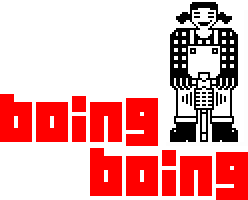
Rare Saber-Toothed Whale, Anime, Carnival Dark Rides, Crime Photos, Tech Reviews, Gadget Tips—Boing Boing Has It All
At the dawn of blogging in 1995, Mark Frauenfelder moved his ‘zine Boing Boing online. Boing Boing—whose mission was to explore “the coolest, wackiest stuff”—became and remains one of the Internet’s most popular blogs. Defying the corporatization of the blogosphere, Boing Boing has remained a curio of oddities, tech news, gadget tips and real-life marvels with 2.5 million unique visitors a month. Now, Frauenfelder shares daily blogging duties with a troika of other passionate editors Cory Doctorow, David Pescovitz and Xeni Jardin. “The recipe for an excellent blog is to be so deeply obsessed with something that you need to communicate it to others,” says Frauenfelder. “If Boing Boing stopped making money tomorrow, I’d still need to do it.” Here are his ten tips for creating a successful blog:
1. Tap into the Zeitgeist. If you can tap into the right cultural moment you’ll have a lot of fans. Hugh Hefner had a vision of where people were headed in postwar America. Riding on the crest of the Pill and new attitudes toward sexuality, Playboy magazine appealed to enough people to make it a cultural phenomenon. Jann Wenner, founder of Rolling Stone did it, too. And the same sort of lucky thing happened with BoingBoing. When computers became cheap enough for creative people to buy, I was fascinated by how our future would be re-imagined through this consciousness-altering technology. It just so happened there were enough people out there interested, too. Sometimes you have the good luck of being the messenger for a larger cultural movement. Once you’re out there, you have the advantage of being first.
2. Be original. If you try to emulate a successful blog, you’ll just be a second-rate version of something already out there, and who needs that? Make the blog that doesn’t exist yet, but that you’d want to read.
 3. Make the connection. One fax machine is worth nothing, but once you have two or three fax machines, they start to gather value because they connect with each other. It’s called the “Network Effect” and it’s the same with the Internet. What’s killer about the Internet is that anybody can create a worldwide community that connects to other people with the same interests. Instead of obsessing on digital marketing the mission of the blog should be to share information with like-minded people.
3. Make the connection. One fax machine is worth nothing, but once you have two or three fax machines, they start to gather value because they connect with each other. It’s called the “Network Effect” and it’s the same with the Internet. What’s killer about the Internet is that anybody can create a worldwide community that connects to other people with the same interests. Instead of obsessing on digital marketing the mission of the blog should be to share information with like-minded people.
4. Get an attitude. Without a point of view, your blog is unfiltered mush. Whether you love or hate a blog, you still want it to have a unique perspective. As a kid, I was influenced by the Mad magazine attitude of poking fun at institutions and conventional wisdom. At BoingBoing, we share that subversive attitude. Our readers appreciate it. We’re not afraid to post items that are a little bit mischievous and may get people upset, because that’s a good way to stimulate discussion and promote counterarguments.
5. Don’t waste people’s time. People are busy. They resent it when you waste their time. When the reader comes to our site, they’re not going to land on a post that says, “This is amazing,” and forces you to click on the link. Our posts explain what’s important about what you’re reading and why. It may be tempting to write cute headlines but the most important function of a headline is to sum up what the post is about. If you’ve developed a trust with your readers that they’ll get good value for the time they invest in visiting your site, they’ll be back.
6. Mix it up. Posts that are easy to grasp in a couple of seconds—a bit of shopping news, helpful tips or gossip—get lots of hits and move fast. But, if that’s all you focus on, it dumbs down the site. You’ll have lost any type of gravitas. You have to have an editor’s gut feeling to get the mix right. We’re as likely to have a post about a chilling political development as something on the frothiest bit of pop culture.
7. Appeal to the novelty gene. It’s good to blog frequently, but the stuff you blog about has to be unexpected or people will lose interest. They say that there is a novelty-seeking gene. It causes people (like me!) to crave excitement, and to want constant hits of surprising things that don’t fit the conventional model of the way the world works. Ninety-nine percent of what’s out there is crap. Our job is to put in the hard work to find that 1 percent that’s fascinating.
8. Let feedback change you. Once I posted a video of a guy who had squirrels eating food out of his bird feeders. He had a contraption that flung the squirrels out of the bird feeders, and I got a lot of emails saying, “That’s no way to treat an animal.” And, I thought, “Wow, that was really dumb.” Another post was a beauty contest of women who were in jail—a Hot or Not of incarcerated women. Readers complained and explained that the majority of women in prison are dealing with tough circumstances, bad domestic situations, mental illness and drug addiction. It would be unthinkable for me to post something like that now. The community feedback has made me more aware of my insensitivities and the blog has evolved because of it.
9. Think of a friend. Blogging can be paralyzing if you worry about trying to please a million people. If you start thinking, “Well, this person might object to that or not understand this,” it’s really going to take the life out of your writing. So to get over blog stage fright, when I post something I’ll often have a friend in mind who has the same sense of humor as me. And often that person will email me saying, “That was great!”
10. Keep it real. I try to limit the echo chamber of the blogosphere. All of our editors travel a lot. We take our cameras and come across interesting people, strange finds, all kinds of surprising things in the world of nature and humanity. I can even find good material in my own backyard. Recently, I saw a few big fat weird bugs called Jerusalem crickets and I took a picture of them next to a quarter. That post got a great response. People love to hear about real life, as if they’re sitting there with you, experiencing it. Once in a while I’ll get sick of the Web and being on the computer and that’s when I’ll pull out my paints and do some art work or go out and do something with my kids like fly a kite.
Buy “The Art of Doing” here. Signup for “The Art of Doing” free weekly e-newsletter. Follow us on Twitter. Join “The Art of Doing” Facebook Community. If you’ve read “The Art of Doing” please take a moment to leave a review here.
Excerpted from a chapter in our book. Reprinted in Fast Company here.
